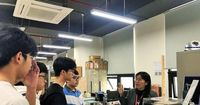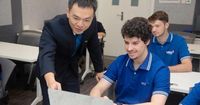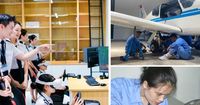The landscape of higher education in Vietnam is shifting as students prepare for the 2025 university and college admissions season. With the rapid advancements in technology and the looming impact of artificial intelligence (AI), both students and educators are grappling with the question of how to choose the right fields of study that will lead to promising career opportunities.
At the recent career guidance fair held in March 2025, one of the most pressing questions among students and parents was whether fields like language studies might be overtaken by AI in this era of workforce reductions and technological advancements. Experts have weighed in on the future job market, stressing the importance of adapting educational programs to meet the evolving demands of the economy.
PGS.TS Thái Bá Cần, the rector of Gia Định University, highlighted that over the next 5 to 10 years, several sectors are expected to experience significant growth. He pointed out that the digital technology industry is emerging with activities such as digital asset production, digital service provision, AI development, and big data analytics, signaling a shift beyond traditional information technology roles.
Moreover, the entertainment and cultural sectors are also poised for growth, propelled by the increasing demand for digital content and services. In healthcare, the integration of AI and big data is transforming medical diagnostics and treatment methods, creating new opportunities for professionals in these fields.
Concerns about unemployment are particularly pronounced this year, with many students uncertain about which fields will provide stable employment and good salaries. PGS.TS Đặng Thị Thu Hương, vice rector at the University of Social Sciences and Humanities, National University of Hanoi, shared insights regarding the journalism sector. She emphasized that the goal of restructuring is to optimize the efficiency of media organizations while adapting to the digital transformation landscape.
Despite the rise of AI, which is changing the face of journalism, Hương reassured students that human journalists are irreplaceable due to their roles in verifying information, recognizing nuances, and providing emotional context. Similarly, Phạm Thanh Hà, deputy head of the training management department at Foreign Trade University, remarked that while AI is a powerful tool in translation, it cannot replace the human touch in understanding cultural intricacies and local customs.
GS. Yann LeCun, head of AI research at Meta, noted that while AI is expected to evolve dramatically in the coming years, achieving human-like intelligence remains a distant goal. He stated that there is no need to fear AI taking over jobs, as current AI systems lack the ability to reason and understand the world as humans do.
Nevertheless, the rapid advancement of technology is undeniably reshaping the job market. According to the World Economic Forum's 2023 report, while millions of jobs may be lost to automation, an equal number of new opportunities are anticipated to arise, creating a dynamic and promising labor market.
In Vietnam, the IT Market Report 2024-2025 from Topdev estimates that the average salary for programmers will range between $1,100 and $3,000 per month, depending on experience and job position. The demand for computer and information technology fields has consistently attracted students, especially as the semiconductor industry faces a significant labor shortage.
Experts emphasize that to ensure employability in any circumstance, students must not only focus on market demand but also enhance their skills and competencies. If graduates possess strong expertise and skills, they can secure desired positions, even in a competitive environment influenced by AI.
To adapt to the changing job market, the Center for Labor Market Forecasting and Information in Ho Chi Minh City (Falmi) has suggested that educational institutions innovate their curricula to equip students with skills suited for the evolving labor landscape. Specifically, Falmi advocates for interdisciplinary training programs that combine knowledge from various fields such as technology, economics, and environmental science.
As the demand for new professions continues to grow, experts believe that training a workforce with a solid foundational knowledge, self-learning capabilities, creativity, and interdisciplinary skills will prepare them to meet the new challenges of the labor market.
In this context, Dr. Lê Viết Khuyến, vice president of the Vietnam Universities and Colleges Association, emphasized the importance of early career guidance in education. He noted that in developed countries, career counseling begins early in secondary education, often through organized sessions involving parents and students to help assess personal interests and aptitudes.
In Vietnam, career guidance has gained attention in recent years, with the government approving a project aimed at enhancing career education in secondary schools. This initiative underscores the critical role of career counseling and streamlining student pathways.
However, with the influx of new information about job market challenges and the impact of AI, students are increasingly anxious about their choices for higher education. The national forecasting efforts regarding labor force development have been underway for years, but there remains a gap between societal expectations and actual outcomes.
According to a survey by the World Economic Forum, many businesses plan to reduce staff due to AI's capabilities, while simultaneously, about 70% of companies are looking to hire individuals skilled in designing AI tools. This duality indicates that while AI will replace many jobs, it will also create new roles that require human oversight and creativity.
As students navigate these uncertainties, they are encouraged to focus on their studies and leverage technology to enhance their efficiency. The evolving landscape of education and employment presents both challenges and opportunities for the next generation.
In summary, the 2025 university admissions season is marked by a critical intersection of technology and education. Students must remain adaptable, continuously upgrading their skills to thrive in a future influenced by AI and digital transformation. By aligning their educational pursuits with the demands of the job market, they can carve out successful careers in an ever-changing world.



